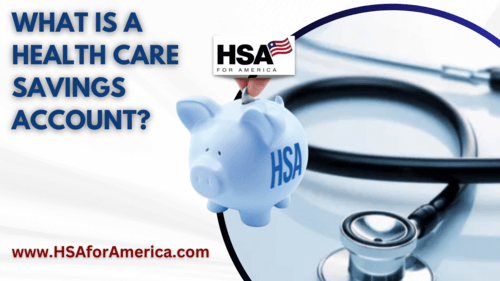A Health Care Savings Account (HSA) is a tax-advantaged account designed to help individual taxpayers save in advance for healthcare costs and significantly reduce both healthcare costs and taxes.

How do Health Care Savings Accounts work?
HSAs offer several important tax benefits that make them an appealing choice for both healthcare financing and long-term retirement planning.
First, when it comes for paying for medical care, HSAs provide a unique triple tax benefit combination that is unmatched by any other type of account:
- Tax-free contributions
- Tax-deferred growth
- Tax-free distributions to pay for qualified medical expenses.
Here’s a closer look at each of these benefits and how they apply to healthcare savings:
Compare Pricing on the Best HSA Plans Available
1. Tax-Deductible Contributions
Every dollar you contribute to an HSA is deducted from your taxable income, directly reducing your annual tax burden.
This deduction applies whether you make contributions via payroll in a pre-tax arrangement or post-tax that you deduct when filing your taxes.
Additionally, HSA contributions reduce payroll and Social Security taxes – making them an even more powerful tax-savings tool – especially for independent contractors and self-employed individuals. HSA contributions help you avoid Social Security and Medicare taxes that can amount to as much as 15.3 percent.
2. Tax-Deferred Growth
Any interest or other earnings on the money in your HSA accumulates tax-free for as long as the money remains in the account.
You can leave the money in your HSA indefinitely: Unlike IRAs and 401(k)s, HSAs do not have any required minimum contributions in retirement.
This means you can allow your HSA balances to compound for as long as you live, if you wish, unmolested by income, dividend, interest, or capital gains taxes.
3. Tax-Free Withdrawals for Qualified Medical Expenses
Withdrawals from HSAs for qualified medical expenses, including deductibles, copayments, and other costs not covered by health insurance, are tax free.
However, withdrawals prior to age 65 for anything other than qualified medical expenses are penalty free and tax free.
Health Care Savings Account Eligibility and Contribution Limits
To open and contribute to an HSA, you must be enrolled in an HDHP or an HSA-qualified Medical Expense Coverage (MEC) plan.
These plans have higher deductibles and lower premiums, making them cost-effective for those who do not frequently need medical services.
For individual and family contribution limits, see IRS Publication 969.
There are no income caps or thresholds on HSA contributions. Anyone can contribute, provided they are enrolled in a qualifying HDHP or MEC health plan, can’t be claimed by anyone else as a dependent, and do not have first-dollar coverage from another health plan, such as VA health care.
Contribution Limits
Those aged 55 and older can add an additional $1,000 as a catch-up contribution. Contributions can be made by the account holder, their employer, or both, making HSAs a potentially valuable employee benefit.
Tax Treatment of Employer Contributions
Employer contributions are tax-deductible to the employer, but not taxable at all to the employee, as long as the money stays in the account or is used for qualified medical expenses.
However, you should take care that your combined employer/employee HSA contributions do not exceed the cap for the year.
HSAs as a Retirement Asset
While Health Savings Accounts (HSAs) are primarily designed to cover current medical expenses, their benefits notably extend into retirement due to their rollover capability and investment potential.
Funds in an HSA accumulate year after year without any requirement to spend the balance, allowing the account to grow over time through investment earnings, akin to a traditional retirement account.
After you turn 65, the usual 20% penalty that applies to non-qualified HSA withdrawals goes away.
You just have to pay the income tax – just as you would with a traditional IRA.
Meanwhile, withdrawals for qualified medical expenses remain tax free and penalty free. This makes HSAs a potentially very powerful and versatile retirement asset.
HSAs therefore, serve as a potential buffer against future healthcare costs, while providing a potential retirement income supplement in later years.
Learn More: The 2024 Guide to Qualified HSA Funding Distributions (QHSAFDs)
Self-Directed Health Care Savings Account Investing
Want to maximize the potential growth of your health savings account?
Consider self-directed investing.
HSAs don’t need to be kept in cash and money market accounts. You can invest your HSA dollars in a variety of asset classes,, including stocks, bonds, and mutual funds, similar to IRAs.
This allows for potentially higher returns, making it a proactive choice for those who want to grow their healthcare funds significantly over time.
However, it also potentially increases risk and volatility. So plan your self-directed HSA investments carefully.
How to Start a Health Care Savings Account
Enrolling in an HSA is straightforward if you have a qualifying HDHP.
Most health insurance providers, employers, and private marketplaces offer HSAs as an option during open enrollment periods.
If you have income from a business or from self-employment, you can also become eligible to make HSA contributions by purchasing an HSA MEC plan to work alongside a high-deductible health plan or affordable health sharing alternative.
Click here for more information on HSA MEC plans, or make an appointment with one of our expert Personal Benefits Managers.
Using Your Health Care Savings Account
Once enrolled, managing an HSA is simple.
Many plans issue a debit card linked to the HSA for easy payment of medical expenses.You can use this debit card to pay for hundreds of potential qualified medical expenses.
You can use your HSA funds at any time for a wide range of qualified medical expenses not covered by the HDHP.
Here are some examples of things you can use your HSA money to pay for, tax free:
- Over-the-counter medications and some nutritional supplements
- Prescriptions
- Deductibles
- Copayments
- Doctor’s visits
- Dental and vision care
- Hospital stays
- Transportation to and from medical appointments
- Certain over-the-counter medications
- Medical equipment
- Long-term care insurance premiums
- Service animals
- Rehabilitation care
You can pay directly from your HSA using a debit card or check, or you can pay out-of-pocket and reimburse themselves later.
Learn More: How To Fix The Most Common HSA Mistakes.
Compare Pricing on the Best HealthShare Plans Available
Health Care Savings Accounts at a Glance
| Pros | Cons |
|---|---|
| Tax-free contributions | Must have a high-deductible health plan |
| Tax-free withdrawals | Limited to qualified medical expenses |
| HSAs can be used with any high-deductible health plan | May be subject to income taxes and a 20% penalty for non-qualified withdrawals |
| Not taxed to spouse when inherited in the case of your death | Taxed as income to non-spousal inheritors |
| Not tied to any particular health insurance company or plan | Excess contributions may result in tax penalties. |
| Unused HSA funds can be carried over from year to year |
To learn more, or to enroll in a high-deductible health plan and start an HSA, make an appointment with a Personal Benefits Manager to discuss your options.
They can provide guidance on how to maximize the use of your HSA, ensuring that you take full advantage of this versatile financial tool. Whether you are managing current medical expenses or planning for future healthcare needs, an HSA offers a tax-efficient solution to both.
For Further Reading: Unlock the Power of Your HSA: Pay for a Chiropractor & Chiropractic Care from your Health Savings Account | Which is Better, Health Sharing or Health Savings Accounts (HSA’s)? | Which Nutritional Supplements You Can’t Pay for From Your HSA

